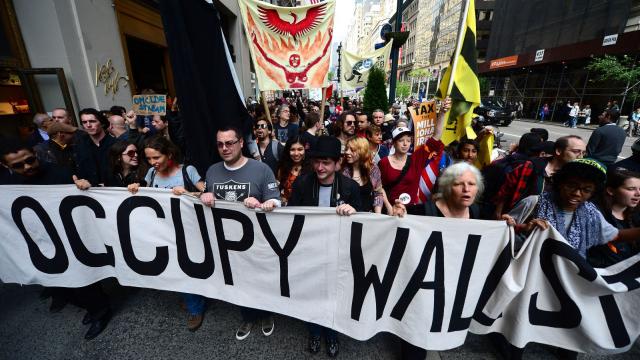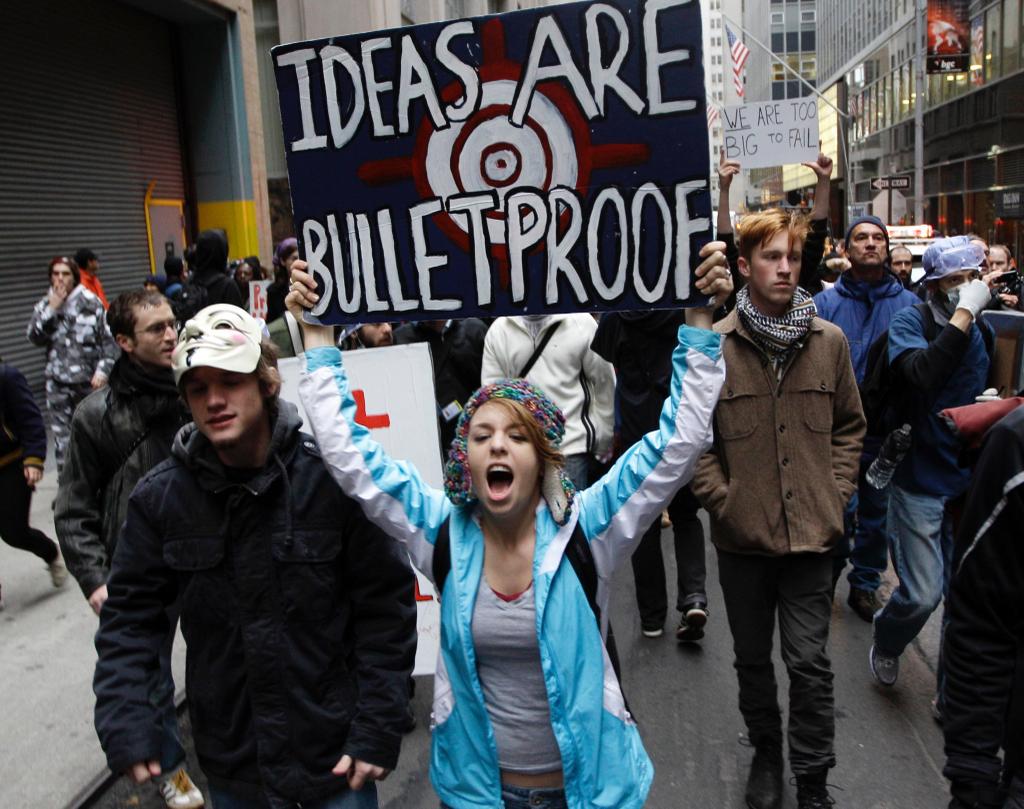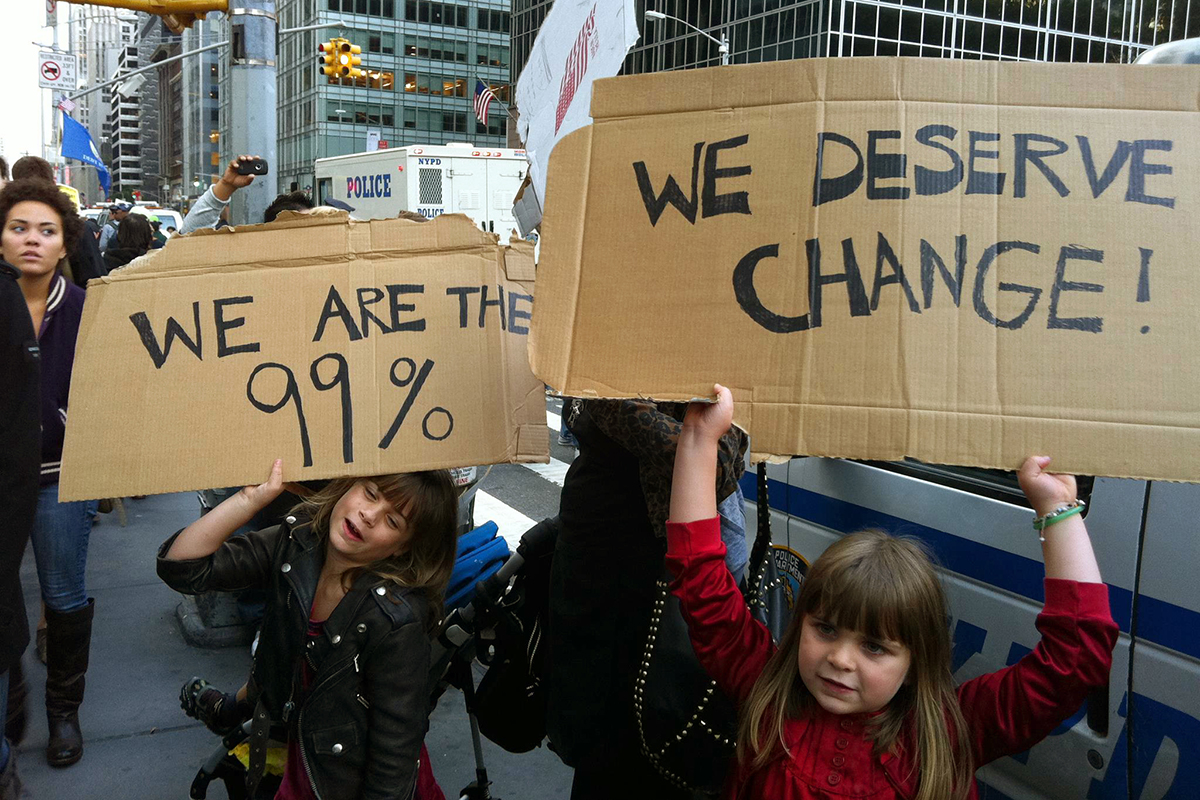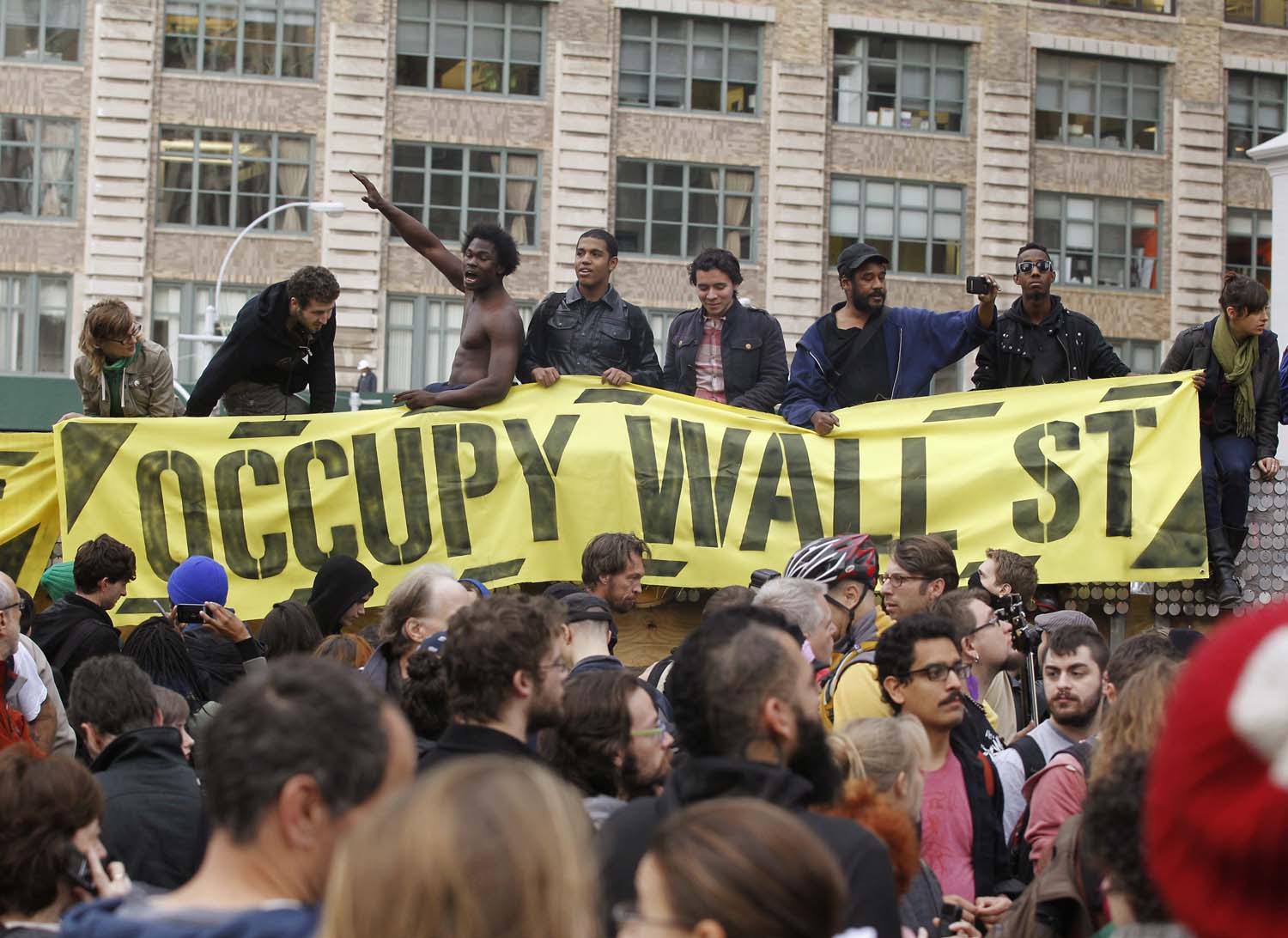
One of the more puzzling aspects about Occupy Wall Street is not that there was a moment when millions of people hoped or feared it might overthrow the rule of the banks, but that so little is said about it four years on.
Its anniversaries come and go without comment: Occupy’s founding on September 17, 2011, the high-water mark of the Oakland general strike on November 2, the eviction of of the New York camp on November 15, the creation of Occupy Sandy after the superstorm walloped the Northeast on October 29, 2012.
Occupy lost its luster because most people concluded it was a failure. It failed to articulate demands, failed to create a lasting impact, failed to spark a revolution. The haters dismiss Occupy as the “Frenzy that Fizzled.” True believers maintain Occupy triumphed for shifting the conversation from economic austerity to inequality, while ignoring the lack of infrastructure to carry its work and ideas forward.
Many who joined or were inspired by it would end up feeling confused, bitter, or disappointed at losing a once-in-a-generation opportunity to upend the status quo. Others blame Occupy’s dissolution on police forces that aggressively swept out all the major encampments. But it’s defeatist to say Occupy was vanquished “by a concerted government effort to undo it.” State violence is a given, and some radical movements still succeed.
Occupiers tried repeatedly to resurrect the movement after the main bastions in Oakland and New York City were evicted in November 2011. But it never regained its footing despite the national May Day general strike, protests against a NATO summit in Chicago, the Occupy Our Homes anti-foreclosure movement, Occupy Sandy, and attempted re-occupations of parks, plazas, and buildings across the country.
No, Occupy Wall Street did not fizzle or fail. Its outsized ambitions were destined to crash as there are no left forces strong enough in the United States to keep a mass movement flying high. Occupy is as relevant as ever; the difficulty in coming to terms with it is because of its mixed legacy. When radicals lost the initiative against a bankrupt political system, liberals stepped in to divert energy back into the system.
Occupy’s birth in the shadow of and days after the tenth anniversary of the September 11 attacks was a rupture. As the first radical movement of the 21st century in the United States, Occupy revived confrontational politics squelched by the “war on terror.” Its use of direct action for wealth redistribution and against state power has been explicitly adopted by today’s immigrant-rights, low-wage worker, and climate-justice movements.
Occupy popularized class lingo with “we are the 99%” and “the 1%,” putting the wealthy on the defensive ideologically. Without Occupy, neither the US$15-an-hour minimum wage movement nor Bernie Sanders’ presidential campaign would have gained such traction.
Activists have tried to anoint successors to Occupy Wall Street, such as Occupy Sandy, the post-hurricane relief effort that was a hybrid of community organizing and charity. But none have matched the spirit or form of Occupy as closely as the Black Lives Matter movement. Now, there is no direct line between the two, as there is with Kshama Sawant. She came to prominence with Occupy, then won election to the Seattle City Council in 2013 on a “$15 Now” platform, and won her re-election last week as a “voice for the 99%” against an opponent bankrolled by CEOs, landlords, and business interests.
Black Lives Matter is the true heir to Occupy because it uses militant protest, digital media, and fluid and opaque leadership structures to challenge state power. The difference is Black Lives Matter began by targeting state force rather than its economic power.
Ironically, by early 2012 some Occupy groups were squandering popular capital on “fuck the police” marches that drew only the hardcore. Black Lives Matter has gone the other way, from a cry against the routine killing of unarmed Blacks to connecting police violence to economic violence. Opal Tometi, a leader of Black Lives Matter, told The Nation that “violence that’s sanctioned by the state” is more than the police. It includes poverty, “attacks on labor unions and what that has done to the standard of living, the employability of our people, the kind of wages that we are making, and the benefits.”
Black Lives Matter has had more staying power even as it has experienced growing pains, strategic splits, and conflicts over who is a leader given the ability to use social media to draw a following. Unlike Occupy, Black Lives Matter is rooted in a community. Black America is shaped as much by the violence that birthed this nation, and sustains it, as it as by the resistive creation that’s grown out of the soiled history.
But that doesn’t make Black Lives Matter immune to attempted co-optation, especially in the crucible of the 2016 election. Just as liberal groups like MoveOn, SEIU, and Rebuild the Dream tried to steal Occupy’s thunder with a “99% Spring” linked to their pro-Democratic Party agenda, so too have groups like the Justice League NYC pushed “establishment-friendly reformism” under the banner of Black Lives Matter.
Post-Occupy, the best organizing combines radical politics with leadership and organization. A few unions have waded into the breach created by Occupy. Public-school teacher campaigns in Chicago, Portland, Los Angeles, and Seattle have tied contract negotiations to student education and community issues, while reviving the use of strikes, walkouts, and protests. The SEIU-backed “Fight for $15” first seized the issue of income inequality in November 2012, just as Occupy had faded, and now 63 percent of Americans support a $15 minimum wage by 2020.
But the fast-food workers struggle is more a march on the media than a rank-and-file movement. Most recently, auto workers rebelled against a fossilized United Auto Workers leadership by rejecting a contract that would have extended a tiered wage system dividing workers.
The climate-justice movement is fractured by the same confrontation and cooptation divide. Blockades from below have slowed the construction of pipelines, the movement of coal trains, the development of natural-gas export terminals, and the sailing of oil-drilling ships to the Arctic. But the 2014 “People’s Climate March,” hyped as the next phase of Occupy, was defanged by well-funded liberals who turned it into a corporate P.R. march devoid of politics, instead of the initial vision of a Seattle-style blockade around the United Nations.
This, too, is the legacy of Occupy Wall Street. Amorphous, “leaderless” networks can respond quickly to a crisis but act as quicksand to movement building. Occupiers wound up butting their heads against the state even as they opened up new paths for their successors. These new movements have had more material success than Occupy Wall Street, but the age-old challenge that Occupy put into stark relief remains: will they settle for reform when they came to have a revolution.
3 WAYS TO SHOW YOUR SUPPORT
- Log in to post comments
















